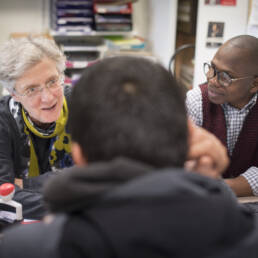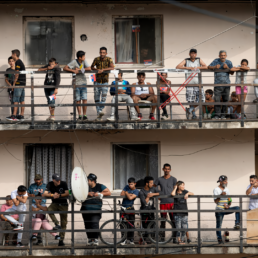Download the full report
In today’s Europe, immigrants are still generally regarded and approached as “strangers”. Do we truly welcome these strangers? Do we embrace them like good Samaritans? Do we actively help them along the road to a better life, do we simply not care or worse still, do we cynically exploit their vulnerability to suit our own needs?
“The just ordering of society and the State is a central responsibility of politics […]” But for politics to take up that central responsibility, research is needed to understand the specific challenges better – and their causes – faced by migrants in our societies concerning discrimination, exclusion and poverty. When we speak exclusion and poverty in today’s Europe, are we sufficiently aware of varying dimensions and perceptions of these phenomena, depending on ethnic, national or cultural origin? Do we sufficiently take into account the causes of migratory movements that brought immigrants in our midst? This current report of Caritas Europa – the first attempt at such research –can offer some answers to these questions. Our study into the links between immigration and poverty in Europe reveals a bleak picture of the of the 56.1 million migrants living in Europe particularly for those 5 million who have irregular status. In this report, we provide evidence in 5 different areas that influence the social situation of migrants and their communities: employment, housing, health, education and participation in public life. For each of these areas, the overwhelming conclusion is that migrants generally find themselves in a worse the nationals.
Moreover, within each of these five areas multiple “poverty traps” exist into which migrants risk falling. Once they are caught in such a poverty trap, a domino effect snares them equally into a similar poverty trap in one of the other areas. This “poverty domino-effect” not only operates ‘horizontally’, but it also perpetuates itself ‘vertically’, i.e. into next generations of migrants living in Europe. The social exclusion and poverty situations faced by migrants are no easy solutions. However, the knowledge that – simply because of their ‘different’ origin – whole generations of our European population often live shadowy under-ground lives that offer limited opportunities and that frequently lead to discrimination, exploitation and abuse, must motivate and inspire Christians, political decision makers and actors in civil society alike, to work and dialogue together in order to jointly find new ways of providing a ‘level playing field’ and equal opportunities for ‘past’ and ‘present’ immigrants into our societies.
In this respect, the words of Pope Benedict XVI are particularly inspiring for Caritas Europa and its members, as organisations of the lay faithful: “[…] The direct duty to work for a just ordering of society, other hands, to the lay faithful. As citizens of the State, they are called to take part in public life in a personal capacity. So they cannot relinquish their participation “ in the many different economic, social, legislative, administrative and cultural areas, intended to promote organically and institutionally the common good”. The mission of faithful is, therefore, to configure social life correctly, respecting its legitimate autonomy and cooperating with other citizens their respective competences and fulfilling their responsibility. Even if the specific expressions of ecclesial charity can never be confused as an activity of the State, it remains true must animate the entire lives and therefore also their political activity, lived as “social charity” These words constitute a call to action. Inspired by these words, Caritas Europa believes that in our approach to the links between poverty and migration, and in our dialogue on these themes with political decision-makers, we need to be guided by principles of global solidarity in caring for and defending the human dignity of the “strangers”. Also in promoting the development of their full potential in their legitimate struggle for a dignified and meaningful life for themselves and their families. Bringing migrants, especially those that are“undocumented” out of the shadows, and ensuring their access to the same rights as those enjoyed by their fellow European citizens with regard to employment, housing, health, education and participation in public life, will enhance legality, will help stabilise the European labour market, will improve living standards and will contribute to a“European Social Model” that we are fighting so hard to sustain.
More information
Caritas Europa
Rue de la Charité 43
1210 Saint-Josse-ten-Noode
Brussels
Tel: +32 (0)2 280 02 80
Fax: +32 (0)2 230 16 58
info@caritas.eu




